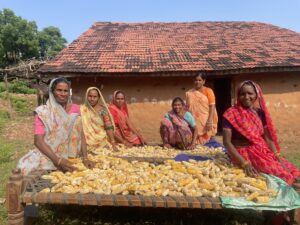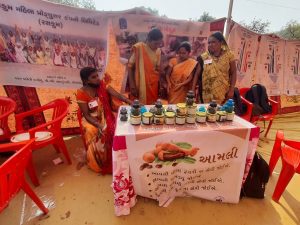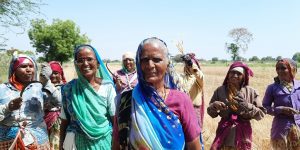In Their Fight For Light Rights, Gujarat’s Women Face Long Battles
- Aarefa Johari
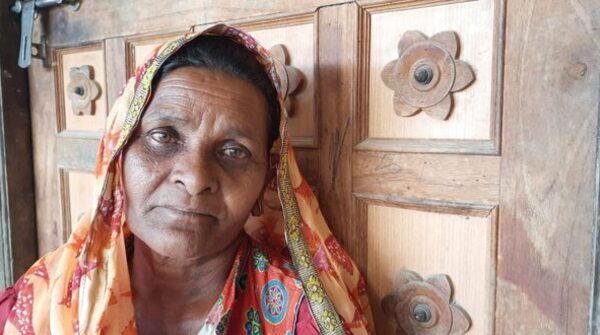
Kanchan Kolipatel is a threat.
It may not be apparent from her short build, soft voice or sorrowful brown eyes. For some members of her family though, her presence in the village is terrifying enough to provoke them into violence.
Kanchan’s brother-in-law has beaten her up several times in the last five years. On one occasion, he dragged her around a room by her hair. This woman farmer from Upardal village in Ahmedabad district’s Sanand block in Gujarat has also had boiling hot water flung at her legs by her nephew.
After all, what could be more dangerous than a widow with no male heirs in a patrilineal, landholding clan, daring to demand her rightful share of the family land?
Lalita and Jyotsna Koli, from Rajgadh village in Surendranagar district, may have answers to that question. Two widows in the same family, with sons who are still minors, are as much of a threat. For the last six years, their father-in-law has been blaming them for the deaths of their husbands, even though the men had died of illnesses.
The Koli women have been told by their brother-in-law that their share of the family’s farmland would be given directly to their sons when they turn 18. Every time the two of them step out to work, their daughters are forbidden from using the household toilet.
In Bhavnagar district’s Ghogha village, Sajida Sheikh would argue that being a woman is enough to pose a threat to men like her cousin. Sajida has teamed up with other female cousins to demand their share in the ancestral property that is legally in their name. For over a decade, her cousin sent sword-wielding men to scare her off every time she attempted to set foot on her land. Two years ago, he stood guard and slapped her across the face as she tried to enter.
Clearly, men from patrilineal agrarian families need no provocation to flex their muscles when women speak up for their legal land rights. For the women who choose to stand up to them, it takes vast reserves of courage, patience and tenacity to win control of their own land.
These four women who have been fighting for years to gain possession of their own land come from different parts of Gujarat, a state where 78.6% of rural women work in agriculture. But of the state’s total agricultural land, only 16% is actually operated by women. The story is not that different for the rest of India. The national average for rural women’s participation in agriculture is 77.3% but only 13.9% of India’s agricultural land holdings are controlled by women, according to the 2015-16 agricultural census.
Laws are gender equal
The wide gender gap in the control and ownership of agricultural land exists though laws governing inheritance – the most common means for women to acquire land – are largely gender equal today.
In 2005, the Hindu Succession Act was amended to grant all married and unmarried daughters the same coparcenary rights as sons over paternal joint family property. In practice, however, fathers and brothers often continue to keep their daughters and sisters out of family land titles, and few women step up to demand their rights.
Rural land-owning families are also reluctant to add married women – wives and daughters-in-law – as joint owners in land titles, particularly when the husband is alive. In Gujarat, there is a special term for the unusual phenomenon of a man formally giving his wife a share in his property in his lifetime: hayaati ma haq, or rights granted during one’s lifetime.
A woman’s rights to a share in her marital property, however, had legal recognition long before the Hindu Succession Act was amended in 2005. But a large section of rural women are formally granted these rights only upon widowhood. In a 2020 paper titled ‘Which Women Own Land in India’, authors Bina Agarwal, Pervesh Anthwal and Malvika Mahesh pointed out that widows are 18% more likely to own land than other women. “Widowhood is…the most important factor affecting a woman’s chances of owning land,” the paper said.
Widows are considered first-order heirs under the Hindu Succession Act, and dozens of landowners interviewed in Gujarat for this article emphasised that a deceased man’s first heir is his widow, followed by his children.
Despite this, widows like Kanchan Kolipatel, Lalita Koli and Jyotsna Koli have been denied their legal rights by male family members. Others, like Sajida Sheikh, have faced aggressive male opposition while demanding their share in parental property.
Lalita and Jyotsna have made little progress in their struggle against the tyranny of their in-laws. Kanchan is exhausted and has paused to draw up a new battle plan. Sajida has won a partial victory but is determined not to give up till she is in complete possession of her land. Their experiences mirror the struggles of thousands of Indian women who are denied their fair share of land and are forced to contend with violence, intimidation and humiliation.
These are their stories.
Return from exile
Kanchan was barely out of her teens in the 1990s when she was married into the Kolipatel family. At the time, Sanand was not the automobile industry hub it is today and was focused entirely on agriculture. It was dominated by farmers from the big landowning castes, the Darbars and Patidars. The Kolipatels have larger numbers but less influence; they are classified as Other Backward Classes and have smallholdings.
The family Kanchan married into had 60 bighas – around 24 acres – of ancestral farmland in her father-in-law’s name. Upon his death, it was to be divided between four men — Kanchan’s husband and his three brothers. None of the wives were included in the land title.
This is a common phenomenon across Gujarat: daughters-in-law are denied joint land ownership on paper, and often have to wait for widowhood to get land titles to their name. For a daughter-in-law to get her share of land upon widowhood without any hitch, it is important for her name to be included in the pedhinama, an official document listing all the legal heirs. But often, daughters-in-law are not named in pedhinamas and are added only when they produce sons.
As a young woman, Kanchan knew little about these issues and spent her days juggling domestic and farm work and raising her first child, a daughter. In 1995, her husband suddenly fell ill. When he died she was pregnant with her second child.
“They waited till my child was born. But when they saw it was another girl, my jeth did everything he could to throw me out,” said Kanchan, 50, referring to her eldest brother-in-law, Haribhai Kolipatel. “He kept telling me that I should leave because I would not be given anything. And after some time, my in-laws stopped giving me any food.”
Too distraught to fight back, Kanchan decided to leave Upardal for the safety of her parents’ home in the neighbouring village. “I raised my daughters there, working as a khet majdoor [farm labourer] and with support from my brother,” she said. “I also got my daughters married from that house.”
Standing up and fighting back
Kanchan would have lived out the rest of her days in her parents’ village had it not been for an unexpected turn of events in 2016. One of her husband’s brothers too died, leaving his wife – Kanchan’s sister – a widow. When Kanchan visited her sister she confronted a painful reality — unlike her, her sister had been handed her inheritance and her sons too had been added to the land title.
“My sister was not treated the way I was because she has sons,” said Kanchan. “My jeth does not have children of his own and his youngest brother had already died unmarried. So he cared for my sister’s boys.”
On one of her visits to Upardal, Kanchan was drawn into a meeting of the Sanand Mahila Vikas Sangathan, a block-level non-profit organisation. The meeting was about women’s right to land ownership as daughters, sisters, wives and widows. Kanchan started attending more of these meetings and in late 2016 decided to claim her right.
“I moved back to Upardal and started living in my old home which is near my in-laws’ house. Then I asked for my land,” she recalled.
By law, Kanchan was entitled to 15 bighas of land – a fourth of her in-laws’ farmland. With this, she could dream of a life where she did not have to work for a daily wage of Rs 150. She could sell the harvest, employ workers and avail loans. She could even split the land with her daughters and make them independent farmers.
But even as she dreamt, Haribhai Kolipatel reacted violently.
“He would hit me a lot when I went to him, and he even turned my sister’s sons against me,” said Kanchan. “Four years ago, one of the boys threw boiling water at me scalding my thighs.”
Humiliated, Kanchan told no one about this abuse for years, not even the social workers from the Sanand Mahila Vikas Sangathan. Even when she finally confided in the collective earlier this year, she ruled out going to the police. “What is the point of doing that? These men will not give me my land if I take them to the police,” she said.
In 2017, Haribhai inexplicably gave her 1 bigha of the 15 in her name, allowing her to grow wheat and rice. But when social workers managed to access her in-laws’ land documents from the village’s revenue officer last year, she understood why.
“It turned out that Kanchan’s name was already on the family’s pedhinama,” said Parul Kolipatel, a para-legal worker with the Sanand women’s group. “Her sister had asked the talati [revenue officer] to add Kanchan’s name as a daughter-in-law while getting her own widow’s inheritance, but she had not told Kanchan about it.”
When contacted, Haribhai refused to talk about the dispute. But Kanchan guesses that he pressured her sister into silence. As a widow listed in a pedhinama, Kanchan is entitled to her husband’s share. By withholding this information and giving her one bigha to farm on, she said, he possibly hoped to put a lid on the dispute.
“Now I am going to get a lawyer and go to court to get my 15 bighas of land,” said Kanchan. “But first I will get my daughters’ names added as heirs in the pedhinama. That way, the three of us can fight together for our rights.”
Facing daily hostilities and harassment
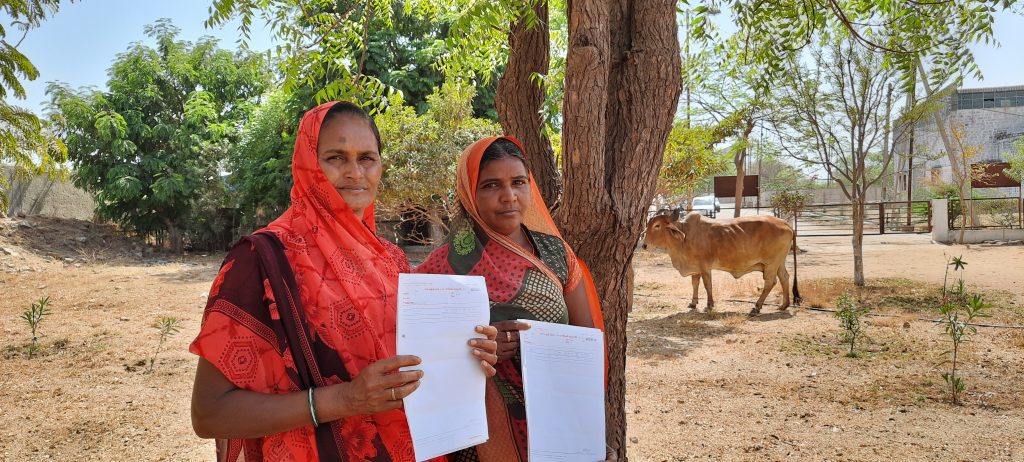
Whenever Kanchan moves to sue her brother-in-law, she will almost certainly win: the land she has been dispossessed of, is already hers by law.
But for Lalita and Jyotsna Koli, there are various complications at work. In a country where maps drawn in government land surveys are often at odds with the informal borders drawn within families, theirs is a story of being left cruelly unmapped.
Both Lalita and Jyotsna are 35, and were married into a family from the dominant Thakor caste. Jyotsna was the “middle” daughter-in-law and Lalita the “youngest”. They were both junior in status to the wife of Ganpatbhai Koli, the family’s eldest son.
For years, as they toiled at home and on the Koli farms, the women believed what their father-in-law, Dayabhai Koli, told them: that he owned 60 bighas of farm land, which he had divided into four equal parts in 2009, a few years after his younger sons were married. One of the four parts was for him, while the rest were for each of his sons to pass down to their own children.
He also had eight daughters, but they were left out of the inheritance.
In 2011, Jyotsna’s husband died of a sudden illness, leaving her with one daughter, two sons, and in-laws who suddenly turned hostile.
“My sasra [father-in-law] started fighting with me almost every day and did not allow me to work on the farm,” said Jyotsna, a shy woman who spoke with her gaze fixed on the floor. “Sometimes, he would say that he was going to sell my husband’s land, and would not give me any money from it. At other times he would say that he will give the land only to my sons when they turn 18.”
In 2015, Lalita’s husband too died of some illness, leaving behind three daughters and two sons. “My sasra and Ganpatbhai started accusing me and Jyotsna of ‘killing’ their sons,” said Lalita, who is taller and more confident than Jyotsna. The two received no financial support from their in-laws, and have been working as farm labourers for Rs 100 a day to raise their children.
The women believe that the harassment they face is intended to drive them out of the house. “When we are out at work, they often harass our daughters and stop them from using the common toilet,” said Lalita. “Once, our sister-in-law actually tried to hit us, saying we should not even be crossing the courtyard because we are widows.”
Two years ago, in a moment of helplessness, Jyotsna and Lalita buckled under the pressure, returning to their parents’ homes for a few weeks. “But then we decided to come back, because we wanted to keep an eye on our land and fight for it,” said Jyotsna.
With no knowledge on how to fight for their land rights, they sought the help of social workers from SWATI – the Society for Women’s Action and Training Initiative – a non-profit group that has been active in Surendranagar for decades. SWATI took a month to convince the sarpanch and talati of Rajgadh to give them copies of the Koli family’s land records.
It transpired that the official map of their land looked nothing like the descriptions of their father-in-law. “On paper, Dayabhai Koli has no land to his name at all, and neither do Lalita and Jyotsna’s husbands,” said Rita Jhala, the social worker handling the case. “So how can they get their rights as widows?”
Done out of fair share
To begin with, Dayabhai Koli originally owned 54 bighas of land, not 60. In 1995, when his younger sons were still minors, he officially split his land into three very unequal parcels: 9.5 bighas were registered in his wife’s name, 15 bighas in his own and 29.5 bighas in his eldest son Ganpatbhai’s name. Then, sometime after Lalita’s husband died in 2015, Dayabhai and Ganpatbhai decided to sell off the former’s 15 bighas.
From the property that now remains, Lalita and Jyotsna are eligible to inherit only from the 9.5 bighas in their mother-in-law’s name, that too after her time.
“They cannot be legal heirs of their brother-in-law, even though he has most of the land,” said Jhala. “So we are demanding to know how his name was put on most of the land when there were other children in the family.”
In 2019, Jhala helped Jyotsna and Lalita file a case of property dispute with the district magistrate. “But the case has been stuck there. We have no idea how long it will take and how it will end,” she said. In the handful of hearings that took place before and during the Covid-19 pandemic, Dayabhai and Ganpatbhai did not show up.
When contacted, Dayabhai completely dismissed the dispute. “There is no case of this sort. I had three sons and I already gave 15 bighas to each of them, and I own 15 bighas too,” said Dayabhai, denying that the official land records showed a different pattern of ownership. He claimed his middle son died of a “mental illness” and his youngest son died of cancer. “After they died I gave my daughters-in-law their rights. Why wouldn’t I? There is no problem.”
Jyotsna and Lalita are afraid they might be running out of time.
“Our sasra and Ganpatbhai are planning to sell more land, and some interested buyers have already visited the farm,” said Lalita. The market rate in the region is Rs 3.5 lakh per bigha, so the men stand to gain in crores if they choose to sell the entire plot. “We know they will not give us any of the money if they sell. What will we do then?”
Power of sisterhood
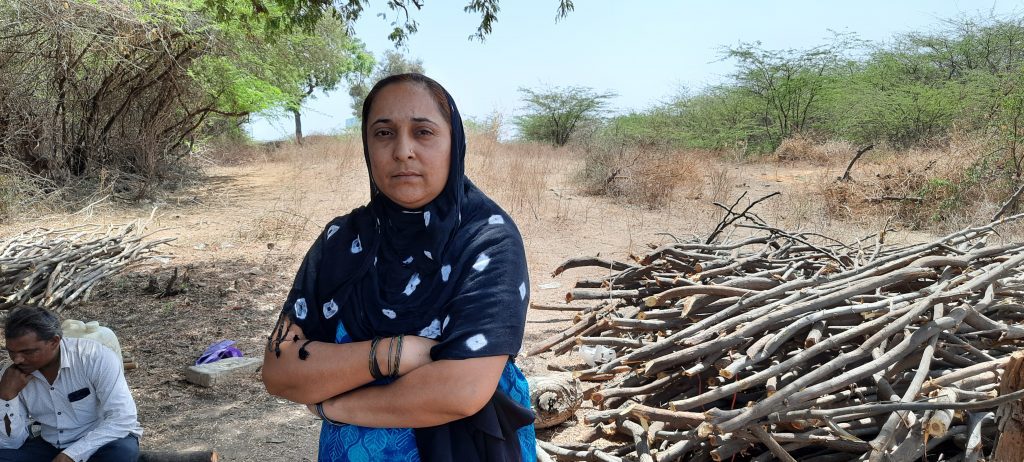
More than 200 km away, in the coastal town of Ghogha in Bhavnagar district, Sajida Sheikh can hope for justice.
On March 20, a day she will never forget, she took her first steps on the 5-bigha parcel of land that had been denied to her for 18 years. The land was rocky, undulating, and full of tall shrubs and brambles, but it still lifted Sajida’s spirits.
“I cried tears of joy that day, even though I know I have a lot more land to fight for,” said Sajida, a round faced, cheerful 36-year-old. “There was a time my family grew groundnuts, jowar, bajra and cotton on this soil. I will make sure to grow it all again.”
Sajida’s husband, like many other Muslim men in Ghogha, is a fisherman. Unlike the wives of other fishermen, however, Sajida was never content to run the house, raise her son and help her husband sell fish. “I have always wanted to be a farmer, like everyone in my parents’ family,” said Sajida, who lost her mother when she was a baby. “I have grown up with farming, I know how to do it, and I love it.”
This passion is why Sajida has kept up the long-term family feud with her 50-year-old cousin, Haji Hasan, the son of her mother’s oldest brother.
The dispute began in 2002 over a 40-bigha plot in rural Ghogha that belonged to Sajida’s maternal grandfather. When he died in the early 1990s, the land was to be divided equally – 10 bighas each – between his four children. By 2002, however, three of his four children had died, and Haji Hasan, the oldest among two grandsons and seven granddaughters, had taken over the entire property.
“My uncle Adam was the only one of my mother’s brothers still living, and he decided to file a case against Hasan in the district court,” said Sajida.
Sajida is enraged about how the case ended: In 2015, after her uncle Adam died, his son agreed to a settlement with Haji Hasan. “All the cousins took part in the court settlement, except my sister and me,” said Sajida. “We did not even know it was happening because no one told us about it.”
In the settlement, it was agreed that Haji Hasan would keep 25 bighas of the land while Adam’s son, who works as an electronics technician in Muscat, would get 5 bighas. Since Haji Hasan’s three sisters did not lay any claim to the property, the remaining 10 bighas were to be divided between four women: Sajida, her sister Munira who is divorced and lives with Sajida, and their two female cousins, Minaz and Reshma, who live in neighbouring Bhavnagar city.
“It makes no sense, it is totally unfair. Munira and I should be getting 10 bighas as our mother’s inheritance,” said Sajida, fury thickening her voice. “If I had been party to that settlement meeting, I would never have accepted this deal.”
In 2016, with the help of her husband, Sajida and Munira filed an appeal against the settlement. The case, which is still ongoing, is against all of Sajida’s cousins, including Minaz and Reshma.
Outside the court, however, the four women are not adversaries.
“Minaz and Reshma are on our side now because Haji Hasan was refusing to actually give us our land,” said Sajida. “He told the court he had already handed over the land that we were supposed to get according to the settlement. In reality, his goondas always threatened us with swords and rods when we tried to enter the property. Once, Hasan slapped me for trying to go there.”
Shaken, Sajida went straight to the police but she was let down, she said.
“They did not file any case against him. Instead, they just called him and gave him a warning,” said Sajida. For two years after that, Sajida was too intimidated to follow up on the case. Then in January, she met field workers from the Samarthan Mahila Sangathan, a Bhavnagar-based women’s group that is “notorious” for mobilising women to fight for their rights.
“They helped me get over my fear. And together, we warned Hasan that we would get 3,000 women to come and help me take over the land,” said Sajida. “Maybe because of this, and maybe because he realised he will lose the court case one day, he suddenly agreed to give us five bighas of the land.”
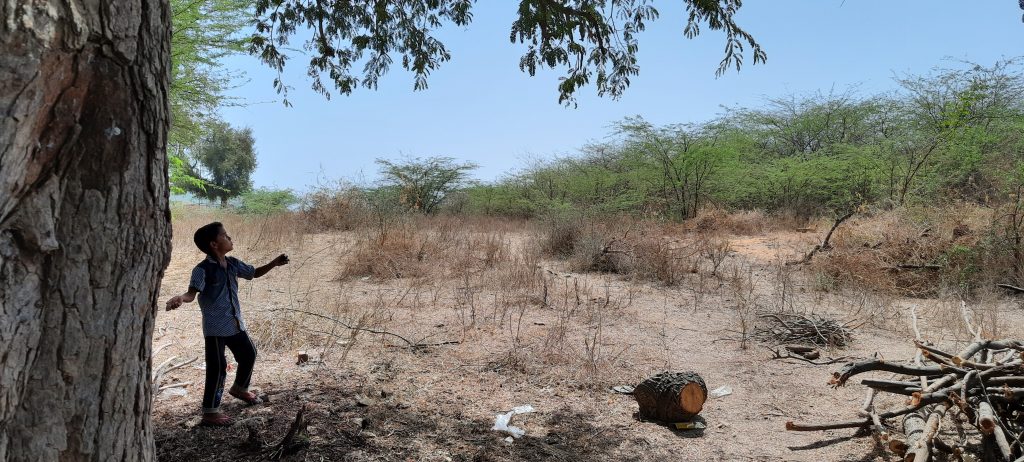
When contacted, Haji Hasan agreed to a brief phone conversation. He claimed that the court dispute over their family land is “over”, and that he has given five bighas of land to his cousins Minaz and Reshma. He distinguished them as the daughters of his “kaka” (father’s brother), unlike Sajida and Munira, who are daughters of his “fai” (father’s sister).
“I have given my kaka’s daughters five bighas, and that is the amount of land owed to them,” said Haji Hasan. “I don’t owe Sajida or her sister any land. My father already gave their mother the share that was owed to her as his sister. He had purchased a separate plot of land for her when she got married and she chose to build a house on it.”
Sajida dismissed Haji Hasan’s claims, particularly that the five bighas of land he has handed over are meant only for her cousins Minaz and Reshma. The land, she said, was given to all four women.
It was a partial victory, but on March 20, Sajida, Munira, Minaz and Reshma enjoyed it wholly.
“We have decided to work together now,” said Sajida. “Hasan owes us 20 bighas in all. And when we win it, we will farm on all of it together, us four sisters.”
This reportage is part of the WGWLO and BehanBox fellowship on women’s land, forest and farming rights in Gujarat
This story is edited by Malini Nair
We believe everyone deserves equal access to accurate news. Support from our readers enables us to keep our journalism open and free for everyone, all over the world.
